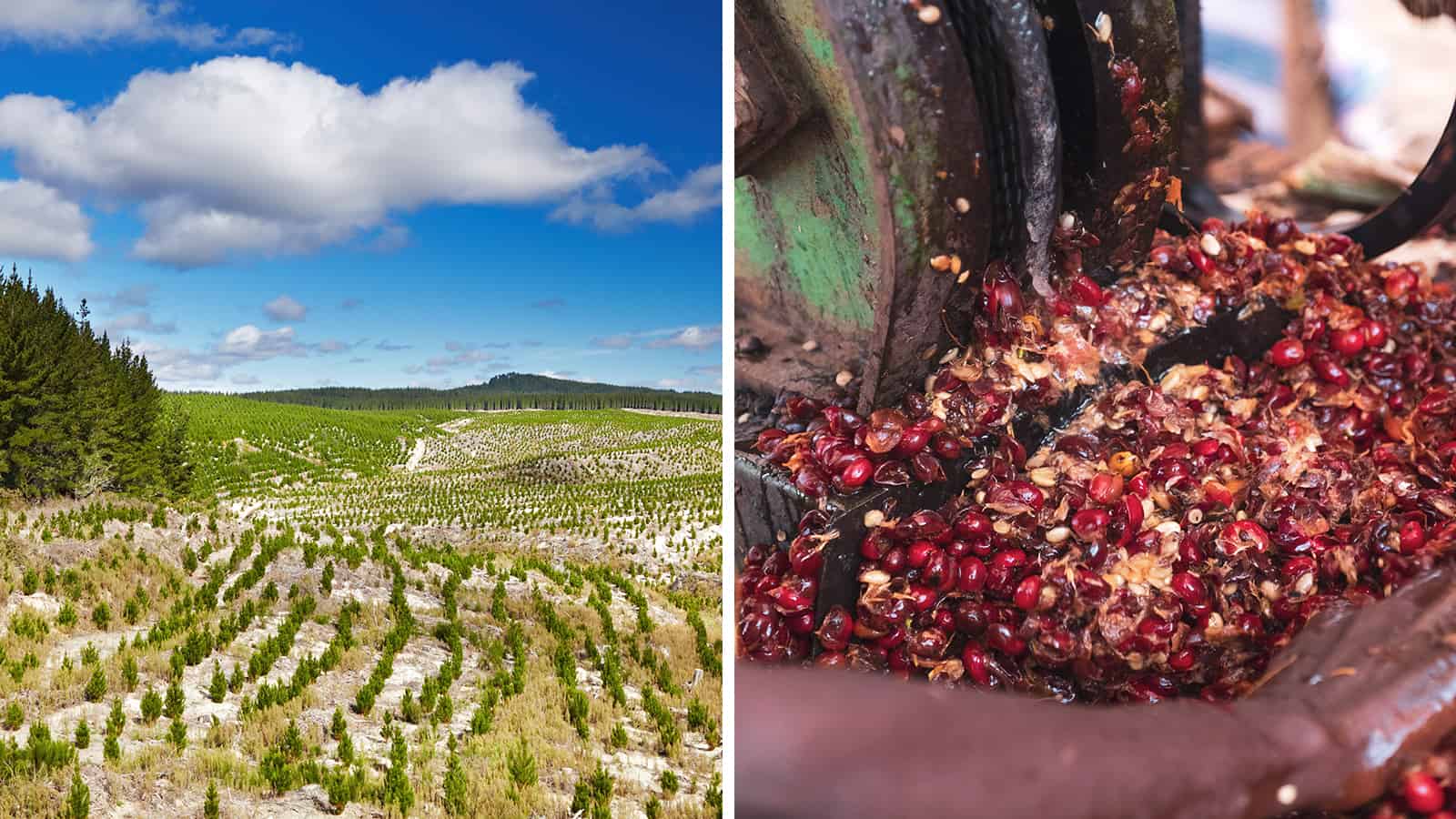A recent study found that coffee pulp, a waste product of coffee production, can promote reforestation efforts on post-agricultural land.
The British Ecological Society journal Ecological Solutions and Evidence published these findings.
Researchers from ETH-Zurich and the University of Hawai`i took part in the study. First, they spread 30 dump truck loads of coffee pulp on a 35 × 40m area of barren land in Costa Rica. This equated to about 20 inches of coffee pulp. For a control, they marked a similar-sized area of land that didn’t contain coffee pulp.
Coffee Pulp Promotes Reforestation Efforts, According to Science
“The results were dramatic,” lead study author Rebecca Cole, an environmental scientist at the University of Hawaii at Manoa, said in a news release.”The area treated with a thick layer of coffee pulp turned into a small forest in only two years while the control plot remained dominated by non-native pasture grasses.”After two years, the land treated with coffee pulp had 80% canopy cover compared to 20% on the control site. Also, the canopy in the coffee pulp section grew four times taller than that in the control area.
Adding the 20 inches of coffee pulp helped eradicate invasive pasture grasses which had taken over the land. These grasses often inhibit tree species from thriving. Once the grasses had been removed, the native tree species (from seeds that arrived through wind and animal dispersal) began repopulating.
The coffee pulp also helped revive the soil in the treated area. After two years, researchers measured significantly elevated carbon, nitrogen, and phosphorus levels in the ground compared to the control. However, potassium, a nutrient essential for growth, measured lower in the coffee-treated area than in the control plot.
The findings showed promise since the soil on tropical agricultural land becomes highly degraded over time. Poor soil quality can delay reforestation for decades.
The coffee pulp may help save tropical forests around the globe
Instead of throwing out coffee byproducts such as pulp, agricultural companies can use them to repopulate forests. Since it’s widely available and high in nutrients, coffee pulp serves as an affordable way to reforest the land.
Dr. Cole said: “This case study suggests that agricultural by-products can be used to speed up forest recovery on degraded tropical lands. When processing these by-products incurs a cost to agricultural industries, using them for restoration to meet global reforestation objectives can represent a ‘win-win’ scenario.”
To achieve the climate objectives of the 2015 Paris Accords, we must make reforestation a priority. Planting more trees means having less carbon dioxide in the atmosphere since trees absorb it at 48 pounds per year. The coffee pulp may go a long way in helping to reach those goals.
The study on how coffee pulp can help revitalize forests
Researchers conducted the survey in Coto Brus county in southern Costa Rica. It took place on a former coffee farm that’s now being reforested for conservation. In the 1950s, developers converted the land to coffee agriculture and pasture. As a result of the rapid deforestation, forest cover fell to 25% by 2014.
For the study in 2018, researchers measured out two areas of roughly 35 x 40m. They spread about twenty inches of coffee pulp on one site and left the other as a control.
Next, the team analyzed soil samples for nutrients right before applying the coffee pulp and two years later. Additionally, they recorded the species on the land, the thickness of tree stems, and the percentage of forest ground cover. They utilized drones to observe canopy cover.
The coffee-composted plot contained five different tree species, while the control area had only one.
Scientists need to study these findings further.
While the team recorded valuable information, Dr. Cole says more research is necessary to confirm the findings.
“This study was done at only one large site, so more testing is needed to see if this strategy works across a broader range of conditions. The measurements we share are only from the first two years,” she said. “Longer-term monitoring would show how the coffee pulp affected soil and vegetation. Additional testing can also assess whether there are any undesirable effects from the coffee pulp application.”
One caveat to using coffee pulp or other agricultural waste products is that they only work in certain situations. Companies and growers can only use them in relatively flat, easily accessible areas that delivery trucks can get to. Also, nutrient runoff into nearby watersheds can be better managed in these areas. So, researchers would have to develop another solution for hillier lands used for agriculture.
Dr. Cole said about future research on using coffee pulp for reforestation efforts: “We would like to scale up the study by testing this method across various degraded sites in the landscape. Also, they might try the concept with other types of agricultural non-market products like orange husks.
“We hope our study is a jumping-off point for other researchers and industries to look at how they might make their production more efficient by creating links to the global restoration movement.”
Final thoughts on how coffee pulp helps repopulate forests
The new study by researchers from ETH-Zurich and the University of Hawai`i shows how coffee pulp can revitalize forests around the globe. After just two years, the team found that 80% of a forest in Costa Rica treated with coffee pulp had regrown. The canopy in this area also grew four times taller than that in the control plot. However, the research team found that the coffee pulp would only work in flat, easily accessible agricultural areas.
In the future, they hope to study other products such as orange husks to see their effect on reforestation. This study proves that the planet will keep providing for us if we reuse and recycle more often. As this research shows it’s important to give back what we take to maintain equilibrium with nature. So, you can feel good about your coffee addiction because it might save the planet.
















 Community
Community

